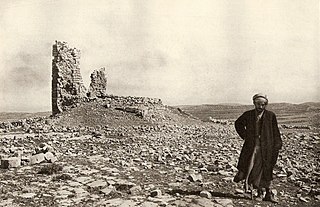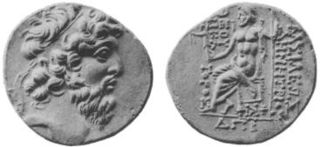Related Research Articles

The 2nd century BC started the first day of 200 BC and ended the last day of 101 BC. It is considered part of the Classical era, although depending on the region being studied, other terms may be more suitable. It is also considered to be the end of the Axial Age. In the context of the Eastern Mediterranean, it is the mid-point of the Hellenistic period.
This article concerns the period 169 BC – 160 BC.
This article concerns the period 179 BC – 170 BC.
Year 187 BC was a year of the pre-Julian Roman calendar. At the time it was known as the Year of the Consulship of Lepidus and Flaminius. The denomination 187 BC for this year has been used since the early medieval period, when the Anno Domini calendar era became the prevalent method in Europe for naming years.
Year 153 BC was a year of the pre-Julian Roman calendar. At the time it was known as the Year of the Consulship of Nobilior and Luscus. The denomination 153 BC for this year has been used since the early medieval period, when the Anno Domini calendar era became the prevalent method in Europe for naming years.
Year 162 BC was a year of the pre-Julian Roman calendar. At the time it was known as the Year of the Consulship of Corculum/Lentulus and Figulus/Ahenobarbus and the Second Year of Houyuan. The denomination 162 BC for this year has been used since the early medieval period, when the Anno Domini calendar era became the prevalent method in Europe for naming years.
Year 166 BC was a year of the pre-Julian Roman calendar. At the time it was known as the Year of the Consulship of Marcellus and Galus. The denomination 166 BC for this year has been used since the early medieval period, when the Anno Domini calendar era became the prevalent method in Europe for naming years.
Year 170 BC was a year of the pre-Julian Roman calendar. At the time it was known as the Year of the Consulship of Mancinus and Serranus. The denomination 170 BC for this year has been used since the early medieval period, when the Anno Domini calendar era became the prevalent method in Europe for naming years.

Year 175 BC was a year of the pre-Julian Roman calendar. At the time it was known as the Year of the Consulship of Scaevola and Lepidus. The denomination 175 BC for this year has been used since the early medieval period, when the Anno Domini calendar era became the prevalent method in Europe for naming years.

Demetrius I, surnamed Soter, reigned as king (basileus) of the Hellenistic Seleucid Empire from November 162 – June 150 BC. Demetrius grew up in Rome as a hostage, but returned to Greek Syria and overthrew his young cousin Antiochus V Eupator and regent Lysias. Demetrius took control during a turbulent time of the Empire, and spent much of his time fighting off revolts and challenges to his power from threats such as Timarchus and Alexander Balas.

Antiochus V Eupator, whose epithet means "of a good father" was a ruler of the Greek Seleucid Empire who reigned from late 164 to 161 BC.

Antiochus III the Great was a Greek Hellenistic king and the 6th ruler of the Seleucid Empire, reigning from 222 to 187 BC. He ruled over the region of Syria and large parts of the rest of western Asia towards the end of the 3rd century BC. Rising to the throne at the age of eighteen in 222 BC, his early campaigns against the Ptolemaic Kingdom were unsuccessful, but in the following years Antiochus gained several military victories and substantially expanded the empire's territory. His traditional designation, the Great, reflects an epithet he assumed. He also assumed the title Basileus Megas, the traditional title of the Persian kings. A militarily active ruler, Antiochus restored much of the territory of the Seleucid Empire, before suffering a serious setback, towards the end of his reign, in his war against Rome.

Ptolemy VI Philometor was a Greek king of Ptolemaic Egypt who reigned from 180 to 164 BC and from 163 to 145 BC.

Antiochus IV Epiphanes was a Greek Hellenistic king who ruled the Seleucid Empire from 175 BC until his death in 164 BC. He was a son of King Antiochus III the Great. Originally named Mithradates, he assumed the name Antiochus after he ascended the throne. Notable events during Antiochus's reign include his near-conquest of Ptolemaic Egypt, his persecution of the Jews of Judea and Samaria, and the rebellion of the Jewish Maccabees.

Judah Maccabee was a Jewish priest (kohen) and a son of the priest Mattathias. He led the Maccabean Revolt against the Seleucid Empire.

The Battle of Beth Zechariah was a battle around May 162 BC during the Maccabean revolt fought between Jewish rebels under the leadership of Judas Maccabeus against an army of the Seleucid Empire, the Greek successor state (diadochi) to the Macedonian conquests that controlled Syria and Babylonia. The battle was fought at Beth Zechariah and was a Seleucid victory, with the rebels driven from the field in retreat. Judas's brother Eleazar Avaran died in combat with a war elephant. The defeat allowed the Seleucids to continue their campaign and besiege the Jewish holy city of Jerusalem.

The Battle of Beth Zur was fought between the Maccabees led by Judas Maccabeus and a Seleucid Greek army led by Regent Lysias in October 164 BC at Beth Zur. According to the books of Maccabees, the rebels won the battle, although how significant this victory really was is disputed; it is possible the battle's result was inconclusive. Through a stroke of good fortune for the rebels, the days after the battle likely coincided with news of Seleucid King Antiochus IV Epiphanes's death reaching Judea; rather than continue the campaign, the Seleucid army and Lysias returned to the capital to handle the leadership transition. The Maccabees were able to capture Jerusalem soon after.
Lysias was a 2nd-century BCE general and governor of Syria under the Seleucid Empire.

The Syrian Wars were a series of six wars between the Seleucid Empire and the Ptolemaic Kingdom of Egypt, successor states to Alexander the Great's empire, during the 3rd and 2nd centuries BC over the region then called Coele-Syria, one of the few avenues into Egypt. These conflicts drained the material and manpower of both parties and led to their eventual destruction and conquest by Rome and Parthia. They are briefly mentioned in the biblical Books of the Maccabees.

The Seleucid Dynastic Wars were a series of wars of succession that were fought between competing branches of the Seleucid royal household for control of the Seleucid Empire. Beginning as a by-product of several succession crises that arose from the reigns of Seleucus IV Philopator and his brother Antiochus IV Epiphanes in the 170s and 160s, the wars typified the final years of the empire and were an important cause of its decline as a major power in the Near East and Hellenistic world. The last war ended with the collapse of the kingdom and its annexation by the Roman Republic in 63 BC.
References
- ↑ "ANOTHER VIEW OF HALLEY`S COMET -- FROM 164 B.C." Chicago Tribune. Retrieved April 26, 2022.